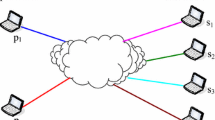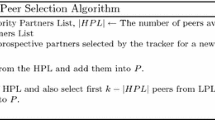Abstract
In the last few years, new service providers are growing in the Internet scenario to create new multimedia services. The most common approach to this end is based on peer-to-peer (P2P) networks. The new service providers are manifesting great interest not only for classical multimedia applications, like video streaming and video on demand, but also for multi-party games, private video-chat rooms, videoconference and real-time video teaching, usually containing a small number of high-interactive group members. The target of this paper is to define a multipoint multimedia communication platform for such kind of applications, accounting both peer set variation (peer arrivals and departures) and peer bandwidth modifications. In addition, a revenue model for providers of this kind of services is proposed to allow them to design their networks in order to maximize their revenue while satisfying user requirements in terms of both admission rejection probability and perceived quality on the received video stream.














Similar content being viewed by others
References
Banerjee S, Bhattacharjee B, Kommareddy C (2002) Scalable Application Layer Multicast. Proc. of ACM Sigcomm 2002, Pittsburgh, Pennsylvania, August 2002
Bindal R, Cao P (2006) Can self-organizing P2P file distribution provide QoS guarantees. ACM Operating Systems Review 40(3):22–30
Bonald T, Massoulié L, Mathieu F, Perino D, Twigg A (2008) Epidemic live streaming: optimal performance trade-offs. In Proc. SIGMETRICS 2008, Annapolis, Maryland, USA, pp. 325–336, June 2–6, 2008
Castro M, Druschel P, Kermarrec A-M, Nandi A, Rowstron A, Singh A (2003) SplitStream: high-bandwidth content distribution in a cooperative environment. In: Kaashoek MF, Stoica I (eds) IPTPS 2003. LNCS, vol. 2735. Springer, Heidelberg
Chu Y-H, Rao SG, Zhang H (2000) A case for end system multicast. In Proceedings of ACM SIGMETRICS
Couto da Silva AP, Leonardi E, Mellia M, Meo M (2008) A bandwidth-aware scheduling strategy for P2P-TV systems. In Proc. IEEE P2P’08, Aachen, DE, September 2008
Deshpande H, Bawa M, Garcia-Molina H (2001) Streaming live media over a peer-to-peer network. Technical Report of Database Group, CS-2001-31, Stanford University
Goyal VK (2001) Multiple description coding: compression meets the network. Signal Process Mag 18(5):74–93
Hauske G et al (2003) Subjective image quality of low-rate and low-resolution video sequences. MoMuC 2003, pp 5–8
Incarbone G, Schembra G (2007) Peer admission control in a real-time P2P video distribution platform: definition and performance evaluation. PV
Incarbone G, Schembra G, Lombardo A (2007) Applying P2P to achieve real-time multimedia communications: modeling and performance analysis. Globecom
Intel integrated performance primitives, http://www.intel.com/cd/software/products/asmona/eng/302910.htm
Jannotti J, Gifford DK, Johnson KL, Kaashoek MF, JWO Jr. (2000) Overcast: reliable multicasting with an overlay network. In Proc. Operating Systems Design and Implementation, pp. 292–301, October 2000
Kim Y-H, Kang SG, Kim H-S (2009) Efficient tree management for resilient overlay multicast. ICACT
Kung H, Wu C (2003) Differentiated admission for peer-to-peer systems: incentivizing peers to contribute their resources. In Proceedings of Workshop on Economics of Peer-to-Peer Systems (Berkely, CA, June 2003)
Liu Y, Guo Y, Liang C (2008) A survey on peer-to-peer video streaming systems. Peer-to-Peer Networking and Applications, No. 1, pp. 18–28
Lombardo A, Morabito G, Schembra G (1998) An accurate and treatable Markov Model of MPEG-Video Traffic. Proc. IEEE Infocom ‘98. San Francisco, CA, USA. March 29–April 2, 1998
Lombardo A, Reforgiato D, Schembra G (2009) P2P and MPEG FGS encoding: a good recipe for multipoint video transmission on the internet. International Journal of Digital Multimedia Broadcasting
Marfia G, Pau G, Di Rico P, Gerla M (2007) P2P Streaming systems: a survey and experiments. 3rd STMicroelectronics STreaming Day (STreaming Day’07), Genoa, Italy, September 14, 2007
Noh J, Baccichet P, Mavlankar A, Girod B (2008) Un-leeching P2P streaming by active overlay management. Globecom
Padmanabhan VN, Sripanidkulchai K (2002) The case for cooperative network-ing. In: Druschel P, Kaashoek MF, Rowstron A (eds) IPTPS 2002. LNCS, vol. 2429. Springer, Heidelberg, pp 178–190
PlanetLab http://www.planet-lab.eu/
Raghuveer A, Dong Y, Du D (2007) On providing reliability guarantees in live video streaming with collaborative clients. In Proceedings of MMCN (San Jose, CA, January 2007)
Sentinelli A, Celetto L, Lefol D, Palazzi C, Pau G, Zahariadis T, Jari A (2009) “A Survey on P2P Overlay Streaming Clients”, IOS press “Towards the Future Internet—A European Research Perspective,” ISBN 978-1-60750-007-0 pp. 273–282
Tran DA, Hua KA, Do T (2003) ZIGZAG: an efficient peer-to-peer scheme for media streaming. Proc. Of IEEE INFOCOM 2003, pp. 1283–1292
Venkataraman V et al (2006) Heterogeneous unstructured tree-based peer-to-peer multicast. ICNP
Venkatraman V, Francis P (2005) ChunkySpread overlay multicast. In Proc. 2nd Symposium on Networked Systems Design and Implementation, May 2005
Wang YK. Method, device and system for effective fine granularity scalability (FGS) coding and decoding of video data. Intern. Application N. PCT/IB2006/000631
Wang M, Li B (2007) R2: random push with random network coding in live peer-to-peer streaming. IEEE JSAC, Dec 2007
Wang M, Xu L, Ramamurthy B. Providing statistically guaranteed streaming quality for peer-to-peer live streaming. In Proc. of the 18th International Workshop on Network and operating systems support for digital audio and video
Wang F et al (2008) Stable peers: existence, importance, and application in peer-to-peer live video streaming. In Proc. of IEEE INFOCOM 2008, April 2008
Xu D, Hefeeda M, Hambrusch S, Bhargava B (2002) On peer-to-peer media streaming. In Proceedings of IEEE ICDCS (Austria, July 2002)
Zhang X, Liu J, Li B, Yum TP (2005) CoolStreaming/DONet: a data-driven overlay network for efficient live media streaming. infocom
Zhang J, Liu L, Ramaswamy L (2007) PeerCast: churn-resilient end system multicast on heterogeneous overlay networks. Journal of Network and Computer Applications (JNCA), Elsevier
Zhang M, Sun L, Xi X, Yang S (2008) iGridMedia: providing delay-guaranteed peer-to-peer live streaming service on internet. In Proceedings of GLOBECOM’2008. pp. 1741–17
Zhang M, Xiong Y, Zhang Q, Yang S (2005) A peer-to-peer network for live media streaming: using a push-pull approach. In Proc. Of ACM Multimedia 2005, November 2005
Zhang M, Zhao L, Luo J, Tang Y, Yang S (2005) Grid-Media: a peer-to-peer network for streaming multicast through the internet. In Proc. ACM Multimedia 2005, November 2005
Acknowledgments
The authors wish to thank the anonymous reviewers for their constructive and useful comments and suggestions, which have led to enhance the quality of this paper.
Author information
Authors and Affiliations
Corresponding author
Additional information
This work is partially supported by the Italian MIUR PRIN 2007 project “Sorpasso”. Moreover, the work leading to this invention has benefited from a fellowship of the Seventh Framework Programme of the European Community [7° PQ/2007-2013] regarding the Grant Agreement n. PIRG03-GA-2008-231021.
Rights and permissions
About this article
Cite this article
Incarbone, G., Lombardo, A., Reforgiato, D. et al. A comprehensive platform to manage peer churn and bandwidth fluctuations in real-time multimedia P2P networks. Multimed Tools Appl 63, 851–873 (2013). https://doi.org/10.1007/s11042-011-0943-6
Published:
Issue Date:
DOI: https://doi.org/10.1007/s11042-011-0943-6




